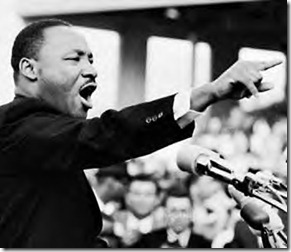I saw Lincoln over the holidays. Then recently I heard some clips of Martin Luther King, Jr.’s “I Have a Dream” speech. I was struck by the largeness, the monumental, historical proportions of the issues they faced. In his speech, King referred to “the fierce urgency of now.” It’s easy to see how fiercely urgent that “now” was.
 The rhetoric of the issues soars naturally. The imagery and metaphors stir the soul; shivers traverse the spine. The right of humans to be free! The abomination of one human “owning” another human! The equal humanity of mankind, regardless of skin color! Now THAT is something worth fighting for! If blood must be spilled, let it only be spilled for causes so grand and glorious!
The rhetoric of the issues soars naturally. The imagery and metaphors stir the soul; shivers traverse the spine. The right of humans to be free! The abomination of one human “owning” another human! The equal humanity of mankind, regardless of skin color! Now THAT is something worth fighting for! If blood must be spilled, let it only be spilled for causes so grand and glorious!
And then there are today’s issues. The most pressing: the federal debt and deficit. The fierce urgency of now? It’s more like the tepid urgency of 10 years from now. Ho hum. Booooooring. qoijasrtudkajdaoivmiop. Sorry, I just fell asleep and my head hit the keyboard. I think I broke the delete key.
Let’s do a compare and contrast of speeches then and a hypothetical parallel speech now:
MLK: “I have a dream that my four little children will one day live in a nation where they will not be judged by the color of their skin but by the content of their character. I have a dream today!”
ME: “I have a dream that my yet unborn great great grandchildren will one day live in a nation where government revenues will equal or exceed government expenditures. I have a dream today!”
Lincoln: “Now we are engaged in a great civil war, testing whether that nation, or any nation, so conceived and so dedicated, can long endure. We are met on a great battle-field of that war. We have come to dedicate a portion of that field, as a final resting place for those who here gave their lives that that nation might live. It is altogether fitting and proper that we should do this.”
ME: “Now we are engaged in a sequestration argument, testing whether this nation, or any nation, so indebted and so over-commited, can long endure. We are met in a great smoke-filled back room of that argument. We have come to dedicate a portion of that room, as a final resting place for the expensive oil-on-canvas portraits of those who here gave their political careers in exchange for multimillion dollar lobbying jobs requiring little actual work that this nation might live. It is altogether inconsequential that we should do this.”
Chills, anyone? Yeah, me neither.
So let’s just admit and agree that one of the greatest debates of our time stirs the souls of only a few CPAs and nerd economists. But does that mean it is less important? Is now less fiercely urgent than 1863 or 1963?
Shivering spines (or lack thereof) notwithstanding, I contend that now is fiercely urgent. I contend that the urgency of now measures up to any time in American history. The stakes of the budget debate are not simply about money, or mere debits and credits. The stakes are the survival of the nation. The stakes are the free market economy that has fueled the unprecedented prosperity we enjoy. It will not collapse today or this year. It will probably not happen on Obama’s watch. But our trajectory is toward bankruptcy and economic collapse. We ignore this boring problem at our own peril.
Understanding these issues takes time, and may even mean (gasp!) turning off the TV to read something pretty wonkish about what is really going on with the budget. It’s not as simple as “Cut spending! Cut taxes!” and then everything’s fine. Neither is it as simple as “Tax the rich!” and then everything’s fine. It’s not nearly as exciting as some of the other big issues, including gun control. It’s difficult to think about it in concrete, tangible terms. But it’s fiercely important. We’ll be talking about it in some more wonkish ways right here on this blog (while trying to keep it semi-light and get an occasional chuckle if we can).
If you’re comfortable leaving these problems to Obama, Boehner, and Reid, don’t worry about it. We’ll let you know how it goes.
If, however, you understand that those empty suits lack the vision and courage to fix the mess, then begin now arming yourselves with an understanding of the budget, the deficit, the debt, the structure of government spending, and proposals to place us on the path to claw out of deficit, and then out of debt. I will endeavor to provide some analysis on this blog, and to do so in a way that is at least semi-non-wonkish (that’s a word, right?). I encourage you to check back and participate in the discussion, here and elsewhere. Our politicians will only begin to fix this when we intelligently demand it. We must lead them.
Finally, do not be fooled: Republicans are not prepared to lead us out of this mess.
Saddle up, folks. We’ve got to fix this. It’s fiercely urgent, and it’s now.
